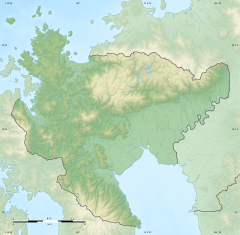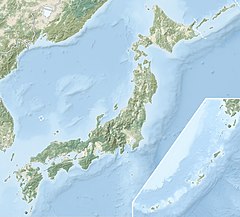Taku Seibyō
| Taku Seibyō | |
|---|---|
多久聖廟 | |
 Taku Seibyō | |
| Religion | |
| Affiliation | Confucianism |
| Rite | Japanese Neo-Confucianism |
| Location | |
| Location | Taku, Saga |
| Country | Japan |
| Geographic coordinates | 33°15′36.0″N 130°5′52.0″E / 33.260000°N 130.097778°E |
| Architecture | |
| Completed | 1708 |
 | |
Taku Seibyō (多久聖廟) is a Confucian temple in the city of Taku, Saga Prefecture, Japan. It was designated a National Historic Site in 1921[1] and a National Important Cultural Property in 1933.[2]
Overview[edit]
The Taku Seibyō is a shrine to Confucius, located on the west side of Mount Shiihara, in the southeast of the city. In 1699, Taku Shigefumi, the local village headman, built the Gakumonsho (later Higashihara Shosha) for the purpose of promoting education and enshrined the statue of Confucius imported from China in its lecture hall. In 1708, the current worship hall was completed at the foot of Mount Shiihara, with a bronze statue cast in Kyoto. After completion, the complex was called Kyōanden (恭安殿), and unusual for Edo period, was an academy open to all students regardless of their social class. The curriculum included Chinese studies and various martial arts. The Taku Seibyō itself is a three-bay Zen Buddhist temple-style structure decorated with a variety of Chinese-style patterns not seen in other Confucius shrines, and carvings on its exterior include the phoenix, kirin, elephant, and dragon, animals which are said to bring about a peaceful and prosperous society with good governance and education. Most of the craftsmen and materials for construction were provided within the village.[3]
It is located approximately 4.3 kilometers, or ten minutes by car, south of Taku Station on the JR Kyushu Karatsu Line.
See also[edit]
References[edit]
- ^ "多久聖廟" (in Japanese). Agency for Cultural Affairs. Retrieved 20 August 2020.
- ^ "多久聖廟" (in Japanese). Agency for Cultural Affairs. Retrieved 20 August 2020.
- ^ Isomura, Yukio; Sakai, Hideya (2012). (国指定史跡事典) National Historic Site Encyclopedia. 学生社. ISBN 4311750404.(in Japanese)
Bibliography[edit]
- Nussbaum, Louis Frédéric and Käthe Roth. (2005). Japan Encyclopedia. Cambridge: Harvard University Press. ISBN 978-0-674-01753-5 OCLC 48943301
External links[edit]
![]() Media related to Taku Seibyō at Wikimedia Commons
Media related to Taku Seibyō at Wikimedia Commons
- Taku City home page(in Japanese)
- Confucian temples in Japan
- Religious buildings and structures in Saga Prefecture
- Important Cultural Properties of Japan
- Buildings and structures in Bunkyō
- Taku, Saga
- Historic Sites of Japan
- 18th-century Confucian temples
- Religious buildings and structures completed in 1708
- Japanese religious building and structure stubs


